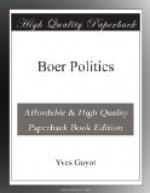But his work is at an end now. He may have succeeded cleverly in deceiving Krueger and Steyn what the European Powers really meant to do, or in giving those same Powers garbled accounts of the state of affairs in the Transvaal, and the true bearings of the Bloemfontein negotiation, yet the fact remains that it is mainly through him that the South African Republics have lost their independence. He could not like Mr. Krueger, excuse himself upon being led astray by blind and ignorant patriotism. He knew well enough how far the very help he depicted as forthcoming could be depended upon, he knew that England was bound to win in the long run, but there was only one thing which he cared for; to make people in Europe believe that he had an important part to play in the political arena. The war came as a welcome diversion to an endurable position. And now that his country’s interests have been entirely sacrificed to his own, he may look upon his work with satisfaction.
APPENDIX E.
THE TRANSVAAL AND THE PEACE CONFERENCE HELD IN PARIS FROM SEPTEMBER 30TH TO OCTOBER 5TH, 1900.
SITTING OF OCTOBER 1ST.
In the English section of the Peace Conference the most prominent members of which were Dr. Clarke, Mr. Moscheles and Mr. Alexander, the following resolutions had been unanimously adopted to be proposed at the Peace Conference:
“That according
to the report sent by the Berne International
Bureau it has come to
the knowledge of the International Peace
Congress, that:
(a) “The
British Government steadily opposed various attempts
made with the object
to submit the South African difficulties to
arbitration.
(b) “Arbitration was eagerly accepted by the South African Republics, who had repeatedly asked for it, therefore, the International Peace Congress feels compelled to arrive at the following conclusions:
1st. “Of
the two opponents the one who declined arbitration,
i.e., the British
Government is responsible for the war in South
Africa.
2nd. “As
long as arbitration can possibly be resorted to the
appeal
to arms is tantamount
to being guilty of a crime against
civilisation and humanity;
therefore,
3rd. “The application of brutal force by Great Britain so as to end their quarrel with the South African Republics deserves an everlasting blame for what must be considered as an outrage against human conscience, and a betrayal of the cause of progress and humanity.”
Then a lengthy discussion arose, in the course of which M. Yves Guyot quoted facts in contradiction to the assertions which the proposed resolution contained.
That resolution was passed in principle by the Congress Commission of Actuality, with the proviso that some words should be left out as being too offensive.




